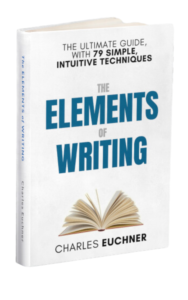Writing well takes some thought. It requires patience and practice. Clear, crisp communication isn’t just something for the storytellers of the world, but it’s for everyone and anyone who has a thought that they want to share.
 Charles Euchner’s latest book Keep it Short: A Practical Guide to Writing in the 21st Century is a primer for everyday writers of emails and professional wordsmiths alike. His expertise on the craft of writing is immeasurable. Thus, I’m thrilled to share the following interview with him that presents tangible steps we can all take to better our writing. Pull out your pens and digital highlighters. It’s time to take some notes!
Charles Euchner’s latest book Keep it Short: A Practical Guide to Writing in the 21st Century is a primer for everyday writers of emails and professional wordsmiths alike. His expertise on the craft of writing is immeasurable. Thus, I’m thrilled to share the following interview with him that presents tangible steps we can all take to better our writing. Pull out your pens and digital highlighters. It’s time to take some notes!
KS: What is your best advice for writers who know that they should “keep it short” but aren’t quite sure how?CE: I ask: On what journey do you want to take your readers? Do you know where you and your readers are at the beginning–what you know, what you’re curious about, what problem you have to solve? Great. A starting place is a great starting place. Then I ask: Where do you want to go? You can’t get anywhere if you don’t know the destination. So what do you want the readers to know and feel at the end of your journey? Do you want them to understand a new argument, get insight from the travails of your story’s hero, or just know more facts and ideas? Once you know where you want to start and finish, figuring out the middle steps gets easier. You can ask yourself: Does this scene/detail/fact/whatever help get me from one place to another different place? If something does not advance that journey, you probably have to get rid of it.
Kris: How can a writer be sure that their intention is clear in a communication?
CE: People know an honest writer in lots of different ways. One of the most important is how clear and direct you are. Simply eliminating all adverbs and most adjectives takes you a long way. These modifiers are really bully words: they tell the reader what to think. Most people would rather figure things out for themselves, with reliable information that you supply. So don’t tell me that someone was brilliant or the house was spooky or the plan was devious. Show me. I know, I know: “show, don’t tell” is the most cliché piece of advice that writers get. But it’s still essential to creating a good relationship between the writer and reader.
KS: Absolutely. Understanding why “show don’t tell” is great writing advice is a big hurdle sometimes. We all hear it, but do we truly understand it? Great point.
CE: You gain credibility in all kinds of other ways too. Define terms simply, so readers have the equipment they need, when they need it. Consider honest objections to your approach. Never talk down to your reader. You want to know what bugs me? The way adults talk to kids. Sometimes they talk to them like they’re pets rather than the amazing brain-sponges they are. That can carry over to writing when you know more than the audience. By the way, you should always know something more than the audience. That doesn’t make you superior. It just means that you decided to explore a topic that readers have not yet explored. So speak directly, without jargon or an attitude.KS: Is there a difference in writing and exploring topics for the business world as opposed to writing for other audiences? Should a writer keep this in mind while they revise themselves?
CE: I disagree with the very idea of “business writing” as opposed to other kinds of writing. Good writing is good writing. Sure, writing for business involves a different purpose and vocabulary than, say, writing a longform narrative piece for Esquire or The New Yorker. I get that. But the essentials are the same. Understand what journey you want to give your reader. Map the steps in the journey. Test what belongs and what doesn’t. Avoid vagueness and jargon.

The key to writing in different fields is knowing what vocabulary the reader brings to the piece. When you need to introduce a new idea, define it clearly. So if you’re writing a business article for a website, you might need to define business terms like ROI, debts and liabilities, or compound interest. So define each term in its own paragraph. Tag the new term, if necessary, with a shorthand term. And then just use that tag in the same way you would with a more expert audience.
Kris: Do you recommend writers edit their work in phases or in one fell swoop?
Charles: Editing cannot happen in “one fell swoop.” Why? Because the brain get drained of energy when you try to perform too many tasks at the same time. In switching tasks–from one aspect of writing to another as you move from sentence to sentence, paragraph to paragraph–you lose sharpness. Your brain is like an SUV. It’s an energy-hungry machine. The brain comprises 2 percent of total body weight but uses more than 20 percent of the body’s fuel. Manage your brain’s resources. Don’t stress them.
KS: Then, not stressing your brain’s resources, what does this step-by-step revision process look like for you?
CE: So I use what I call the “search and destroy” method. Focus, one by one, on different aspects of a piece. First check the overall structure–whether the fragments are well-defined and put in the right sequence. Label them, using “slugs” like tabloid headlines, to capture the essence of these fragments. Then check to see if everything in those fragments speaks to that slug. If it does, keep it; if it doesn’t, toss it. Then start to assess the paragraphs, the same way. Check to see whether your sentences and paragraphs start and end strongly (remember the journey discussion above). When you’ve done all this, you will have checked most of the content. Now focus more on structure, diction, and so on.
KS: That’s a fantastic guide to the editing process, no matter what someone is writing. And when you take a break from your own communications work, what is your favorite bookstore to pick up something perfect?
CE: I’m a New Yorker. Could I possibly say anything besides Strand? I mean, seriously. I go there without any idea what I’m interested in, and I walk out with a few books and lots of notes of books and topics I’ll explore later. Like other cities, New York has lost most of its independent stores, but some are still here. Shakespeare still has a store on the Upper East Side. I pop into Westsider Rare and Used Books, on Broadway between 80th and 81st, whenever I can. I always discover books that slipped through the usual vetting systems–megastores like B&N, book reviews, chatters on radio.
KS: Yes, a good indie bookstore is a fabulous place to take a break from the joys and stresses of the writing life. I couldn’t agree more. What a fabulous note to end on. Thank you so much, Charles Euchner, for your thoughts on revision, and happy writing everyone!


